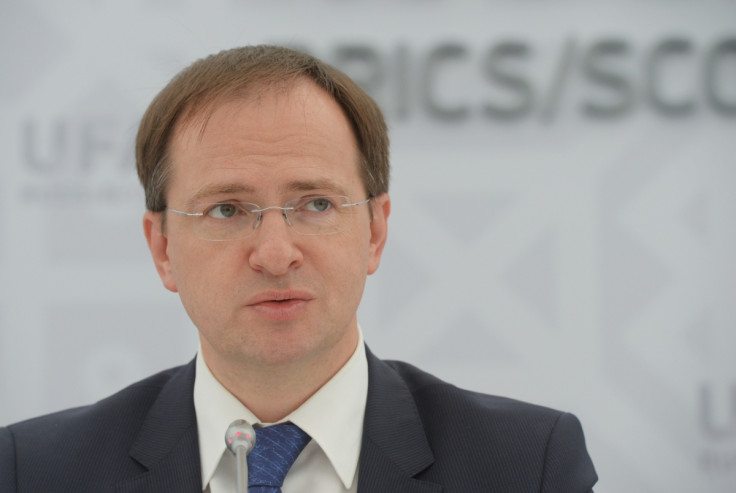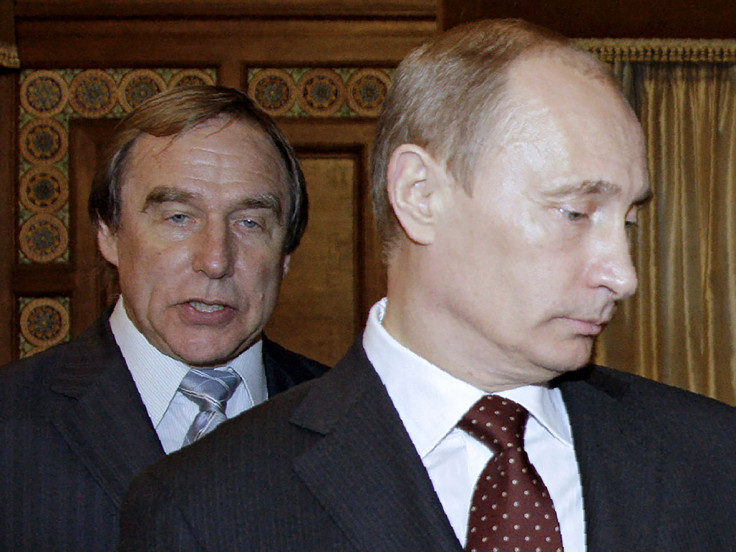Panama Papers: Russia's culture minister Vladimir Medinsky hits out at media coverage

Accusations of corruption against Russia's leadership made in the wake of the Panama Papers leak are a smear by the western media that has little understanding of Russia, the country's culture minister has told IBTimes UK.
In a wide-ranging interview, Vladimir Medinsky criticised the furore surrounding the cellist Sergei Roldugin, named in the leaked Mossack Fonseca reports, said that Russia's giving back of Crimea would be like "for you to give somebody your left hand". However, he expressed hope that ties between Moscow and the UK could improve.
The Panama Papers allege that Roldugin, a close friend of Vladimir Putin (who was not named), controlled either directly or indirectly companies involved in financial transactions with large state-owned Russian companies. A dozen other Russian lawmakers and officials were also named in claims that will be investigated by the Russian Prosecutor's Office.
Medinsky said: "I believe that they [the Panama Papers] have discredited the UK, Iceland and Ukraine in more ways than Russia. I haven't read anything that would destroy Russia. As for me, personally I found nothing new in this investigation," he said.
The Panama Papers allege Roldugin was earning £6.5m a year, had £19m in cash from a stake in the advertising agency Video International, and a separate investment worth £100m. The cellist denies any wrongdoing and told Russian TV the money came from donations to purchase expensive musical instruments for young Russians.
Medinsky said: "I think that the Russians have had enough of it, because there is a lot of talk of trillions of dollars but all they found was a cellist. He is a man who dedicated his whole life to art and he is definitely the most famous cellist in the world now.
"Such an excess of attention drawn to him puts him in an awkward position. It (offshore trusts) are not a problem of Russia, it is a problem of all countries, who have offshore territories. I have seen none in [the far eastern Russian island territory] Kamchatka."
Those implicated in the Panama Papers report have been afforded the opportunity to respond.

Crimea question
Medinsky was in London to promote the UK-Russia Year of Language and Literature. He is a published author himself with one of his books entitled Myths About Russia. Asked what he considered the western myths about Russia to be, he told IBTimes UK that a key one was the idea that the Russians want to conquer.
"When I look at the reaction of the British media to the events in Ukraine and Crimea I believe it says that they have no understanding whatsoever of history and the Russian character. It is not just a lack of knowledge, it is a total ignorance."
Ukraine's President Petro Poroshenko, himself named in the Panama Papers, vowed in January 2016 to win back control of Crimea, which was annexed by Russia and was part of a broader conflict in the east of Ukraine in which more than 9,000 people have died.
Medinsky said: "The west should understand that to give back Crimea for Russians is like for you to give somebody your left hand. It is absolutely impossible. It is as much a part of Russia as Moscow is and St Petersburg is," he said.
He insisted that the US and EU sanctions that ensued will only stiffen the resolve of Russians and that the idea that trade sanctions would sink the popularity of the government "shows a total lack of understanding about Russian psychology.
"The more pressure from the outside, the more the authorities domestically gain popularity. When the living standards go down as a result of military or economic pressure, it doesn't lead to a lower approval rating for the authorities.
"99% of people say 'so what', they don't care. The people don't care about the problems of buying French cheese. The more sanctions the higher the popularity of President Putin."
A survey by the independent Levada Centre in March 2016 showed that the number of Russians who "fully trust" Putin dropped by 10%, but is still high at 73%. The Russian economy is worsening as a result of the sanctions and lower oil prices.
Speaking on the sidelines of the London Book Fair, with prominent Russian authors in attendance, Medinsky hoped that relations, at least in the cultural sphere, could improve between Russia and the UK.
He pointed to events like the Bolshoi Theatre coming to London later this year, the recent Cosmonauts exhibition at London's Science Museum and even the BBC series of War and Peace as examples of how the UK and Russia can become closer.
"They [relations] won't become worse. Any context in the field of language or literature that give our peoples the opportunity to understand each other better is good," he said.
© Copyright IBTimes 2025. All rights reserved.




















